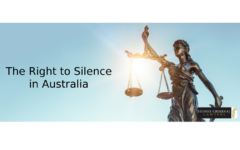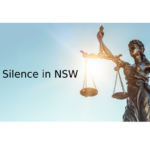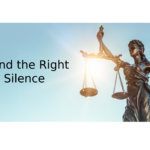The Right To Silence Across Australian Jurisdictions

The right to silence is not protected by the Australian Constitution, unlike in the United States where is is guaranteed by the Fifth Amendment to that nation’s constitution and reflected in what are commonly known as ‘Miranda rights’, also known as the right against self-incrimination.
Rather, protections against a person’s silence being used against them in criminal proceedings have developed in Westminster (British) common law – which is law developed by the courts over many years.
Here’s a general outline of the current protections in states and territories across Australia, as contained in laws and crystalised in formal cautions given by the police.
What is the right to silence?
In short, the right to silence in Australia is derived from various common law principles including the presumption of innocence, the burdens and standards of proof in a criminal trial and the privilege against self-incrimination.
The right to silence means that no adverse inference should be drawn from a defendant’s failure to answer police questions during interview or to present evidence at trial. An ‘adverse inference’ is any kind of assumption or conclusion that a person is more likely to be guilty.
The principle means that, other than their name and address, a charged criminal defendant is not required to provide any information to police (subject to some limitations), and their failure to answer police questions cannot be used against them at trial.
One common limitation to the right to silence in Australia is an exception in circumstances of partial silence. This means that a defendant cannot invoke their right to silence if, during a police interview, they answer some questions but not others. In those circumstances, an adverse inference can be drawn from the fact that they have partially responded to police inquiries.
Generally, it’s best to not provide any response during a police interview, other than providing your name and address – an approach called a “no comment interview”.
The right to silence in New South Wales
The right to silence in NSW is outlined under section 89 of the Evidence Act 1995 (NSW) which provides that:
(1) Subject to section 89A, in a criminal proceeding, an inference unfavourable to a party must not be drawn from evidence that the party or another person failed or refused–
(a) to answer one or more questions, or
(b) to respond to a representation,
put or made to the party or other person by an investigating official who at that time was performing functions in connection with the investigation of the commission, or possible commission, of an offence.
(2) Evidence of that kind is not admissible if it can only be used to draw such an inference.
(3) Subsection (1) does not prevent use of the evidence to prove that the party or other person failed or refused to answer the question or to respond to the representation if the failure or refusal is a fact in issue in the proceeding.
(4) In this section–
“inference” includes–
(a) an inference of consciousness of guilt, or
(b) an inference relevant to a party’s credibility.
This right is severely limited by the operation of section 89A of the Evidence Act which has curtailed the right to silence in certain situations.
A full explanation of the right to silence in New South Wales and its dilution since 1 September 2013 following the enactment of section 89A, as well as situations where the right does not apply at all and witnesses can be compelled to give evidence is contained in this article.
The right to silence under Federal law
The right to silence under Federal law is outlined under section 89 of the Evidence Act 1995 (Cth), which states:
1) In a criminal proceeding, an inference unfavourable to a party must not be drawn from evidence that the party or another person failed or refused:
(a) to answer one or more questions; or
(b) to respond to a representation;
put or made to the party or other person by an investigating official who at that time was performing functions in connection with the investigation of the commission, or possible commission, of an offence.
(2) Evidence of that kind is not admissible if it can only be used to draw such an inference.
(3) Subsection (1) does not prevent use of the evidence to prove that the party or other person failed or refused to answer the question or to respond to the representation if the failure or refusal is a fact in issue in the proceeding.
(4) In this section:
“inference” includes:
(a) an inference of consciousness of guilt; or
(b) an inference relevant to a party’s credibility.
The right to silence in Victoria
The right to silence under Victorian law is outlined under section 89 of the Evidence Act 1995 (Vic), which states:
1) In a criminal proceeding, an inference unfavourable to a party must not be drawn from evidence that the party or another person failed or refused:
(a) to answer one or more questions; or
(b) to respond to a representation;
put or made to the party or other person by an investigating official who at that time was performing functions in connection with the investigation of the commission, or possible commission, of an offence.
(2) Evidence of that kind is not admissible if it can only be used to draw such an inference.
(3) Subsection (1) does not prevent use of the evidence to prove that the party or other person failed or refused to answer the question or to respond to the representation if the failure or refusal is a fact in issue in the proceeding.
(4) In this section:
“inference” includes:
(a) an inference of consciousness of guilt; or
(b) an inference relevant to a party’s credibility.
The right to silence in Queensland
The right to silence under Queensland law is outlined under section 397 of the Police Powers and Responsibility Act 2000 (Qld), which states:
Nothing in this chapter affects the right of a person to refuse to answer questions, unless required to answer the questions by or under an Act.
This preserves the common law right to silence in Queensland.
The right to silence in the Australian Capital Territory
The right to silence under ACT law is outlined under section 89 of the Evidence Act 2011 (ACT), which states:
(1) In a criminal proceeding, an inference unfavourable to a party must not be drawn from evidence that the party or someone else failed:
(a) to answer 1 or more questions; or
(b) to respond to a representation;
put or made to the party or other person by an investigating official who at the time was exercising functions in connection with the investigation of the commission, or possible commission, of an offence.
(2) Evidence of that kind is not admissible if it can only be used to draw an inference mentioned in subsection (1).
(3) Subsection (1) does not prevent use of the evidence to prove that the party or other person failed to answer the question or to respond to the representation if the failure is a fact in issue in the proceeding.
(4) In this section:
“inference” includes the following:
(a) an inference of consciousness of guilt;
(b) an inference relevant to a party’s credibility.
The right to silence in Tasmania
The right to silence under Tasmanian law is outlined under section 89 of the Evidence Act 2001 (Tas), which states:
1) In a criminal proceeding, an inference unfavourable to a party must not be drawn from evidence that the party or another person failed or refused:
(a) to answer one or more questions; or
(b) to respond to a representation;
put or made to the party or other person by an investigating official who at that time was performing functions in connection with the investigation of the commission, or possible commission, of an offence.
(2) Evidence of that kind is not admissible if it can only be used to draw such an inference.
(3) Subsection (1) does not prevent use of the evidence to prove that the party or other person failed or refused to answer the question or to respond to the representation if the failure or refusal is a fact in issue in the proceeding.
(4) In this section:
“inference” includes:
(a) an inference of consciousness of guilt; or
(b) an inference relevant to a party’s credibility.
The right to silence in the Northern Territory
The right to silence under Northern Territory law is outlined under section 89 of the Evidence Act 2011 (NT), which states:
1) In a criminal proceeding, an inference unfavourable to a party must not be drawn from evidence that the party or another person failed or refused:
(a) to answer one or more questions; or
(b) to respond to a representation;
put or made to the party or other person by an investigating official who at that time was performing functions in connection with the investigation of the commission, or possible commission, of an offence.
(2) Evidence of that kind is not admissible if it can only be used to draw such an inference.
(3) Subsection (1) does not prevent use of the evidence to prove that the party or other person failed or refused to answer the question or to respond to the representation if the failure or refusal is a fact in issue in the proceeding.
(4) In this section:
“inference” includes:
(a) an inference of consciousness of guilt; or
(b) an inference relevant to a party’s credibility.
The right to silence in South Australia
The right to silence under South Australian law is outlined under section 18(1)(b) of the Evidence Act 1929 (SA), which states:
the failure of any person charged with an offence to give evidence shall not be made the subject of any comment by the prosecution.
The right to silence in Western Australia
The right to silence under Western Australian law is outlined under section 8(1)(c) of the Evidence Act 1906 (WA), which states:
the failure of any person charged with an offence to give evidence shall not be made the subject of any comment by the prosecution.
Going to court over a criminal matter?
If you are you going to court over an offence, call Sydney Criminal Lawyers anytime on 9261 8881 to arrange a free first conference during which one of our experienced defence lawyers will assess the case, advise you of your options and the best way forward, and fight for the optimal outcome.






